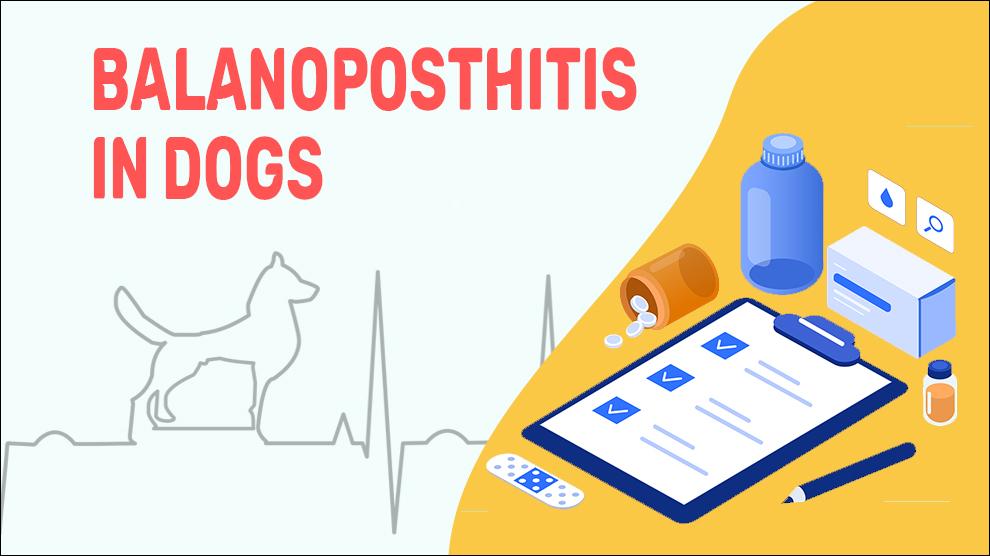What is Balanoposthitis In Dogs?
Let’s make it simple, any disease ending in ‘-itis’ refers to an inflammatory condition.
Balanoposthitis is an inflammation of the penis or prepuce (the sheath of fur-covered skin which protects the penis when flaccid), accompanied by a mucopurulent discharge.
This is common in non-neutered (intact) male dogs. It is usually mild, not often acute, and tends to resolve on its' own. When they do not, serious health issues can develop, such as pain, infection, fevers, urogenital and copulation problems, and sometimes penile tissue necrosis.
The most common cause of balanoposthitis include: injuries, Chemical agitation, Atopic dermatitis, phimosis (the prepuce cannot be retracted to expose the penis), bacterial infections, and tumors.
balanoposthitis is a relatively common condition in dogs as it constitutes 12%- 20% of canine lesions of the penis (or prepuce).
Symptoms Of Balanoposthitis In Dogs
Symptoms of balanoposthitis include:
- Inflammation and swelling of glands and prepuce
- Discharge from the foreskin or penis - mucopurulent (mucus mixed with pus) or blood pus
- Blisters on penis and foreskin
- Excessively licking or biting the genitals
- Cuts or Bleeding and /or pain in the penis or foreskin
- Foreskin and penile mucosa ulcers or in the skin inside the foreskin
- Dry, scaly patches on penis and foreskin, indicative of atopic dermatitis
- Abnormal tissue growth on penis
- Trouble urinating/ urine dribbling/Incontinence
- Discharge from urethra
- In cases of hyperemia- Raised follicles on the penis
- Urinary tract infection
- Kidney stones
Untreated condition results in more serious infections:
- Penis and foreskin scarring
- Abscess on penis or foreskin
- Phimosis (the inability to retract the foreskin or prepuce)
- Pain during copulation
- Reduced libido
- Necrosis of penile tissues
Treatment Options For Balanoposthitis In Dogs
Mild balanoposthitis often gets cleared on its own and it just requires keeping the penis and prepuce clean. If needed, topical antibiotics and antiseptic flushes can be applied.
For chronic, more severe, or recurrent cases- treatment options may include:
- Removal of the underlying cause if one is found, such as tumors, adhesions, or abnormal tissue.
- Application of antibiotic ointment directly into the preputial sheath.
- Use a dilue antiseptic solution (eg, chlorhexidine or dilute povidone-iodine ) to irrigate the preputial sheath.
- Abscesses may be cleaned, lanced, and drained.
- Neutering the dog.
- Phimosis - surgery is required.
- In the most serious cases, when there are lacerations or penile necrosis (tissue death), penectomy (surgically removing the penis) may be performed.
Home Remedies For Balanoposthitis In Dogs
No matter how badly you want relief for your dogs or what you hear from other dog owners, talk with your vet before trying any home remedy.
Despite proper treatments, relapse is common if a predisposing factor is lurking unidentified.
The best you can do in-home is intermittent flushing of the prepuce.
Maybe neutering the dog offers some help in minimizing subsequent infections, although there are no definite ways to prevent the condition.
How to Prevent Balanoposthitis In Dogs?
Obviously, optimizing your pet’s overall health should be the top priority for preventing problems in his genitals from happening in the first place.
Diet: nutritionally balanced, wholesome diet formulated for the dog’s size and lifestyle
Weight: Maintenance of ideal weight for the dog
Exercise: the right amount of exercise is needed, low-intensity exercise leash walking, short hikes, indoor games
Hygiene: Usually dogs self-clean their genitals, but there will be times you may need to clean them using non-scented wipes or just give a quick rinse in running water. Dogs might need a grooming every so often to avoid infections. Use an Elizabethan collar to prevent the dog from excessive licking and self-trauma.
Affected Dog Breeds Of Balanoposthitis
There is no breed disposition. Male Dogs
Additional Facts For Balanoposthitis In Dogs
Causes of balanoposthitis in your dog may include:
- Trauma or self-trauma- such as excessive licking
- Snake or insect bite
- Viral infection, such as canine calicivirus and herpesvirus
- Bacterial infection, such as Escherichia coli, Staphylococcus and Mycoplasma
- Protozoal infections
- Fungal infection, such as Malassezia
- Urinary tract infection
- Hyperemia of the penis, or an excess of blood flow
- Atopic dermatitis
When To See A Vet For Balanoposthitis In Dogs?
Treatment for mild forms of Balanoposthitis in dogs can be done quite easily, and in most cases is very effective.
Proper examination of the entire prepuce and penis for infections, lacerations, and tumors is necessary. Sedation or anesthesia of the animal is required for a thorough examination, particularly if the dog feels pain in the area.
An appropriate diagnosis of this disease is always best left to your vet to make sure that it is not progressing into a serious form.
Dog Food Suggestions For Balanoposthitis
- Nutritionally balanced, wholesome diet
- Avoid DRY FOOD and go for a fresh diet
- When opting for Commercial foods, it should have high-quality, natural ingredients, with no artificial additives.
- The raw diet, Semi-Homemade Food (commercial homemade diet with a dehydrated formula) or home-cooked meals
- Protein (required levels of bioavailable protein)
- Fiber-rich foods: Apples, pears, oatmeal, and other foods
Conclusion
As balanoposthitis is not a disease in itself and it is a symptom, treatment will depend on the predisposing cause.
Mild balanoposthitis may not even require treatment but will be able to resolve in due time.
In more acute cases or doubtful or difficult conditions, always consult a veterinarian.

















